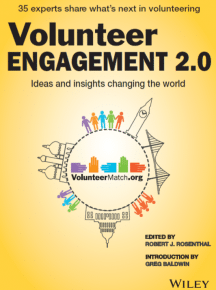
Curated and Edited by Robert Roshenthal, VolunteerMatch
Chapter written by Deirdre White, PYXERA Global CEO, and Amanda MacArthur, Vice President Global Pro Bono and Engagement
Click here for more information.
“Is volunteering truly a free service? Oxford Dictionary defines free as “something given or available without charge.”
Volunteers are excited to give. They are motivated, talented, and make themselves available to you at no charge. They willingly give you their hearts and minds to help you in your mission to make the world a better place. Sometimes, a volunteer’s motivation is professional in nature. The experience helps him or her to develop new skills and advance their careers. On a fundamental level, however, volunteering one’s time and talent makes people feel good. As the pace of life intensifies every year, the experience fulfills a vital social connection, nourishes a sense of purpose, and encourages individuals to tap into something larger than themselves.
Yet, is this infusion of goodwill and talent really free? We propose that, much like the proverbial free lunch, it is not. It is, rather, an exchange grounded in a mutually beneficial experience for your volunteers and your organization. As part of this exchange, volunteers offer their time, energy, and abilities for an experience that produces a change inside, however small or large. The experience even induces the helper’s high, a term coined by psychologists to describe a euphoric feeling that arises after performing a kind act. In exchange for this influx of talent, a nonprofit offers up valuable time and resources for a deliverable that has the potential to be game-changing. Page 329
The State of Pro Bono Today
“My pro bono assignments in Africa changed my mindset and my life. It’s amazing what can happen in a few weeks in a foreign place with organizations and colleagues you don’t know, but come to trust. I’ll never look at my work or the world the same way again.”
This is Matt Berry, vice president of IBM Marketing for Cloud and Smarter Infrastructure. Matt had the opportunity to take part in two pro bono assignments in Nigeria and Tanzania. Changed my life. Amazing. Transformational. We hear words like these all the time. Experiences like Matt’s are just one reason pro bono is on the rise.
From a company’s perspective, there are many clear benefits to pro bono. According to a study on skills-based volunteering by True Impact, employees who participate in pro bono are 47 percent more likely to report high satisfaction than traditional volunteers and 142 percent more likely to report job-related skills gains. Pro bono volunteering also provides far more cost-effective leadership development than traditional executive training programs. And it answers the boisterous call of millennials to inject a social purpose into their jobs and at the places they work. In fact, according to CECP, 71 percent of millennials would likely take a job with a company with a commitment to the community if all other factors were equal.
Although hearts-and-hands or service volunteer rates actually decreased between 2012 and 2013, pro bono continues to grow. Recently, PYXERA Global administered a benchmarking study to 26 of 39 known corporations with active global pro bono programs. In 2006, just five major corporations had global pro bono programs. At that time, these five companies sent just 280 employees on pro bono assignments overseas. In 2013, the 26 companies that participated in PYXERA Global’s study reported that they sent a combined 2,000-plus employees abroad. Additionally, the 13 companies who did not participate in the study sent many others employees abroad. These numbers consistently climbed each year.
Moreover, strong performers are choosing to stay with their companies over time as a result of participating in pro bono initiatives. IBM, for example, found that, in a survey of 575 employees who participated in the company’s global pro bono program, the Corporate Service Corps, 76 percent reported that the experience boosted their desire to complete their careers at IBM.5 It’s for reasons like these that companies are increasing their investments in these kinds of programs.
Despite a mountain of evidence that workers love engaging their professional skills in doing good, most nonprofits say they simply aren’t getting enough pro bono help. Confidence in pro bono work is increasing, but many organizations continue to have difficulty defining their needs and gaining access to pro bono providers.
One thing nonprofits can do to address this gap is to create the kind of experience that individuals want to come back to and share with their colleagues and friends. Remember, as a nonprofit, you have a valuable commodity—the ability to create meaningful experiences that inspire and ignite the passion of pro bono volunteers. This may require a leap of faith on your part. Rather than approaching your volunteers from the mindset of “I’ll take all the help I can get!,” what if you thought of yourself as a provider of incredible journeys of purpose and impact? You have an opportunity to offer your volunteers!” Page 241-242
Deirdre White
Deirdre White is an internationally recognized leader in the field of economic development. As CEO of PYXERA Global, Deirdre spearheaded the growth of best practices in Global Pro Bono to benefit global corporations, local governments, and nonprofits worldwide. Widely cited for her thought leadership, Deirdre has been quoted in The Wall Street Journal, Bloomberg, Forbes, and Fast Company, and contributed to MarketWatch and Stanford Social Innovation Review. Previously, she served as a facilitator of the Employee Engagement Action Network at the Clinton Global Initiative and participated in Rockefeller Foundation’s Bellagio Initiative and the Johnson Foundation at Wingspread’s Leadership Forum for Global Citizen Diplomacy.




